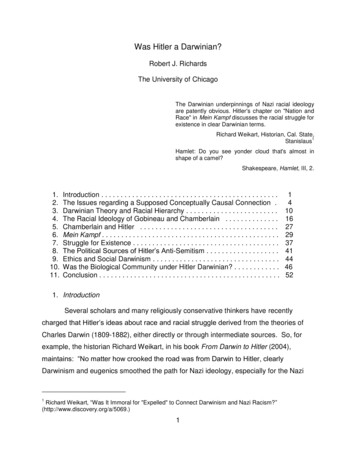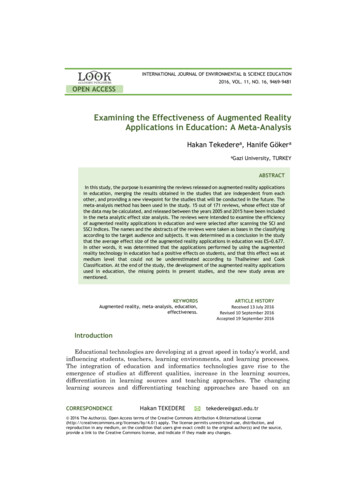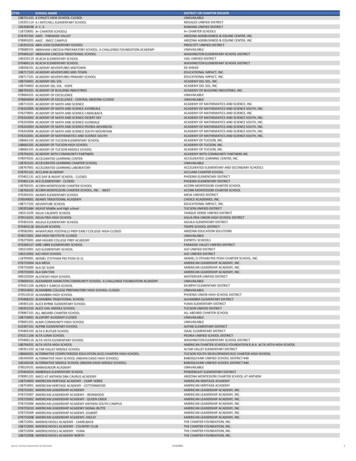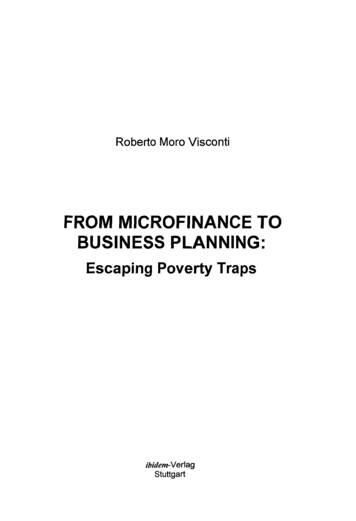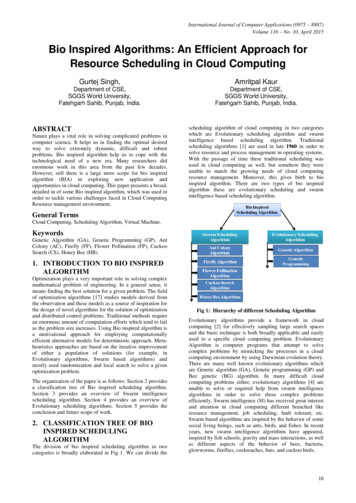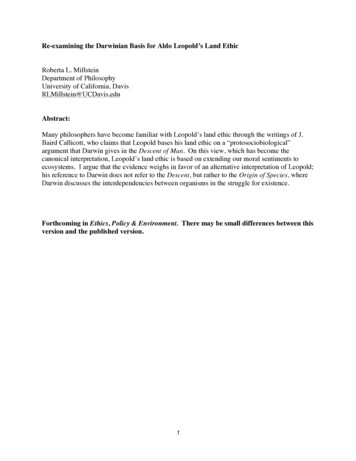
Transcription
Re-examining the Darwinian Basis for Aldo Leopold’s Land EthicRoberta L. MillsteinDepartment of PhilosophyUniversity of California, DavisRLMillstein@UCDavis.eduAbstract:Many philosophers have become familiar with Leopold’s land ethic through the writings of J.Baird Callicott, who claims that Leopold bases his land ethic on a “protosociobiological”argument that Darwin gives in the Descent of Man. On this view, which has become thecanonical interpretation, Leopold’s land ethic is based on extending our moral sentiments toecosystems. I argue that the evidence weighs in favor of an alternative interpretation of Leopold;his reference to Darwin does not refer to the Descent, but rather to the Origin of Species, whereDarwin discusses the interdependencies between organisms in the struggle for existence.Forthcoming in Ethics, Policy & Environment. There may be small differences between thisversion and the published version.1
Draft version: Please do not quote without permissionRe-examining the Darwinian Basis for Aldo Leopold’s Land EthicIt is interesting to contemplate a tangled bank, clothed with many plants of many kinds, withbirds singing on the bushes, with various insects flitting about, and with worms crawling throughthe damp earth, and to reflect that these elaborately constructed forms, so different from eachother, and dependent upon each other in so complex a manner, have all been produced by lawsacting around us (Darwin 1876, 430).1. IntroductionAldo Leopold – well-known forester, wildlife manager, conservationist, and professor – has beenextremely influential in environmental ethics. This is due in large part to the writings of J. BairdCallicott, who has been called the “leading philosophical exponent of Aldo Leopold’s land ethic”(Norton 2002, 127). In the widely-reprinted essay, “The Conceptual Foundations of the LandEthic” and elsewhere, Callicott mounts a spirited and insightful campaign to elaborate anddefend Leopold’s views, in large part based on Leopold’s essay “The Land Ethic,” which waswritten towards the end of Leopold’s life. (Leopold died in 1948; A Sand County Almanac, inwhich “The Land Ethic” appeared, was published posthumously). Since that time, Callicott’sposition has been critiqued on a number of fronts; in some cases, he has modified his position inresponse (e.g., Callicott 1999).However, no one to my knowledge has seriously challenged Callicott’s reading of the Darwinianbasis for Leopold’s land ethic1. According to Callicott, Leopold “unmistakably (if elliptically)1The closest I am aware of is Westra, who asserts that “Leopold’s references to Darwin in theland ethic are primarily to his science; Darwin’s insights are used in support of theinterconnectedness that provides the main reason to abandon purely anthropocentric andeconomic determinations of value” (2001, 263). What I argue for in this paper is in sympathywith Westra’s claim; what I provide that Westra’s essay lacks is defense of this thesis, based on2
alludes” to Charles Darwin’s views on ethics, which in turn were drawn from David Hume andAdam Smith; Callicott further suggests that Leopold draws on Darwin’s “protosociobiologicalperspective on ethical phenomena” (Callicott 1987, 191). I will argue that this interpretation ismistaken – that Leopold was not drawing on Darwin’s ethical views, but rather, Darwin’secological views. This, as I will show, changes the ethical basis for Leopold’s land ethic fromHumean moral sentiments to the interdependencies within biological communities.Before beginning, it is worth considering why we ought to re-examine the Darwinian basis forLeopold’s land ethic. After all, Callicott is certainly free to base his version of the land ethic onDarwinian ethics even if Leopold himself did not. So, why does it matter? There are at leastthree reasons. First, Leopold was an intelligent, thoughtful, and influential man who developedthe land ethic after a lifetime of experiences in wildlife management and related endeavors. Itseems to me that if his ideas are worth citing and discussing at all (and I think they are), it isworth the effort to get his views right. Second, and relatedly, a re-examination might turn upnew ideas that are worthy of consideration, a point emphasized by scholars involved in thehistory of the philosophy of science (HOPOS). Third, the Darwinian/Humean reliance on moralsentiments has been challenged; sociobiology and altruism are likewise controversial topics. Analternative basis would avoid these challenges, although a new set of challenges may be openedup – I will discuss these briefly at the end.passages from Leopold’s writings as well as those of Darwin and others. Furthermore, whereasWestra elaborates a Leopoldian “ethics of integrity,” I am less certain than she is that “integrity”plays the most central role in Leopold’s thinking. More precisely, I think it plays an importantrole, but not as important as stability and land health; in the essay “The Land-Health Conceptand Conservation,” Leopold discusses integrity as a defeasible yet important condition for landhealth, implying that “land health” is the more central term. I will discuss “stability” and “landhealth” further below.3
Draft version: Please do not quote without permissionMy essay is structured as follows. I will begin by summarizing Callicott’s interpretation of theland ethic, followed by my reinterpretation, followed by a discussion of the consequences of myreinterpretation.2. Callicott’s Interpretation of the Land EthicCallicott takes the following passage to be the “summary moral maxim” of Leopold’s land ethic:A thing is right when it tends to preserve the integrity, stability, and beauty of the bioticcommunity.2 It is wrong when it tends otherwise (Leopold 1949, 224-225).Indeed, many philosophers have followed Callicott in focusing on this passage and in taking it tobe a summary statement of the land ethic. Much discussion has gone into understanding andanalyzing the meaning of the key terms, “stability,” “integrity,” and “beauty” – but especiallystability. Callicott also highlights the term “biotic community,” suggesting:The land ethic not only provides moral considerability for the biotic community per se,but ethical consideration of its individual members is preempted by concern for thepreservation of the integrity, stability, and beauty of the biotic community. The land2“Ecosystem” seems closer to (although probably not identical to) contemporary terminology than “bioticcommunity,” given that Leopold clearly meant to include abiotic components such as soils and waters andthat he refers to an “energy circuit” within the biotic pyramid. Other authors have freely equated “bioticcommunity” with “ecosystem,” and the Land Ethic is referred to as a form of “ecocentrism.” However, I willuse Leopoldʼs language throughout most of this essay, except when discussing other authors who usethe term “ecosystem.”4
ethic, thus, not only has a holistic aspect; it is holistic with a vengeance (Callicott 1987,196).Thus, on Callicott’s reading, the land ethic would consider it wrong to allow populations of deer(for example) to increase unchecked and threaten the integrity, stability, and beauty of the bioticcommunity of which they are a part. This seems to be a point of contrast between the land ethicand traditional ethical theories; whereas traditional ethical theories hold individuals to be morallyconsiderable, the land ethic seems to hold the community as a whole to be morally considerable(thus, the assertion that it is “holistic”). And again, many other philosophers have followedCallicott in reading Leopold this way.3But how can this holistic shift be defended? As Callicott notes (drawing on Goodpaster),traditional ethical theory starts with the view that each of us may be taken to hold, namely, thateach of us is intrinsically valuable or that our interests are deserving of moral consideration.However, if I am intrinsically valuable or my interests are deserving of moral consideration, whyis that? Presumably, it is because of some psychological capacity that I have, such as rationality(Kant) or sentience (Bentham) – but then other beings have these capacities, too, and so thoseindividuals (by pain of consistency) are also intrinsically valuable or have interests that aredeserving of moral consideration. In contrast, biotic communities, taken as a whole, lack any3In my opinion, the philosophical literature has placed too much emphasis on this one passage out ofessay out of one of Leopoldʼs books. As my discussion of “stability” below suggests, Leopoldʼs viewsmust be understood in the context of his other writings, life experiences, and influences. Note thatCallicott has since recanted his view that the land ethic is “holistic with a vengeance,” and rightly so;Callicott now suggests that Leopold never meant the land ethic to completely override all of our duties toother humans (Callicott 1999).5
Draft version: Please do not quote without permissionsuch psychological properties.4 So on what grounds could we say that biotic communities aremorally considerable?According to Callicott, Leopold draws on Darwin’s evolutionary account of the origin anddevelopment of ethics, thus inheriting Darwin’s view (itself derived from Hume and Smith) thatethics rests on feelings or “sentiments.” Callicott’s evidence for this claim is as follows.Leopold begins the essay, “The Land Ethic” by noting that in the time Odysseus’s Greece, ethicsincluded wives but did not extend to “slave-girls”; Leopold uses this example to illustrate theclaim that “During the three thousand years which have since elapsed, ethical criteria have beenextended to many fields of conduct, with corresponding shrinkages in those judged byexpediency only” (Leopold 1949, 202). Leopold then asserts (in a passage that is central toCallicott’s interpretation):This extension of ethics, so far studied only by philosophers, is actually a process inecological evolution. Its sequence may be described in ecological as well as inphilosophical terms. An ethic, ecologically, is a limitation on freedom of action in thestruggle for existence. An ethic, philosophically is a differentiation of social from antisocial conduct. These are two definitions of one thing. The thing has its origin in thetendency of interdependent individuals or groups to evolve modes of co-operation. Theecologist calls these symbioses (Leopold 1949, 202; emphasis added).From Leopold’s reference to “struggle for existence,” Callicott plausibly infers that Leopold4That is, the individual members of the community may have those properties, but the community quacommunity does not.6
meant to invoke Darwin. But then, saying that Leopold “manages to convey a whole network ofideas in a couple of phrases,” Callicott claims,The phrase ‘the struggle for existence’ unmistakably calls to mind Darwinian evolutionas the conceptual context in which a biological account of the origin and development ofethics must ultimately be located. And at once it points up a paradox: Given theunremitting competitive “struggle for existence” how could “limitations of freedom ofaction” ever have been conserved and spread through a population of Homo sapiens ortheir evolutionary progenitors? (Callicott 1987, 189).according to Darwin–who had tackled this problem “exclusively from the side ofnatural history” in The Descent of Man–the answer lies in society. And it was Darwin’sclassical account (and its divers variations), from the side of natural history, whichinformed Leopold’s thinking in the late 1940s. Darwin turned to a minority tradition ofmodern philosophy for a moral psychology consistent with and useful to a generalevolutionary account of ethical phenomena. A century earlier, Scottish philosophersDavid Hume and Adam Smith had argued that ethics rests on feelings or “sentiments”–which, to be sure, may be both amplified and informed by reason. And since in theanimal kingdom feelings or sentiments are arguably far more common or widespreadthan reason, they would be a far more likely starting point for an evolutionary account ofthe origin and growth of ethics (Callicott 1987, 189-190).Callicott then explains how, on Darwin’s account, advantages could have been conferred on7
Draft version: Please do not quote without permissioncommunities composed of parents and offspring who had bonds of “affection and sympathy” thatcould be extended to less closely related individuals; such communities might be able to defendthemselves more successfully or provision themselves more efficiently. If so, “moralsentiments”5 would spread through a population.In short, from Leopold’s brief comment that an ethic is a limitation on freedom of action in thestruggle for existence, together with Leopold’s emphasis on extending ethics to societies andcommunities, Callicott infers that Leopold not only accepts and refers to Darwin’s explanation ofthe origin of ethics, but also that Leopold accepts and refers to the whole Darwinian account ofethics, including its basis in Humean/Smithian ethics.It is certainly possible that Leopold meant to do this. But Callicott’s interpretation seems to bebased on scanty evidence at best. Leopold was not a casual or dilettante writer. In the course ofhis career, he published about five hundred distinct items (Aldo Leopold Papers). “The LandEthic” was written shortly before his death, although it was based on several earlier essays(Meine 1987), and like all the other essays he published, it went through multiple drafts thatothers commented on. There are no references to “moral sentiments” (much less Hume orSmith) or the evolutionary benefits conferred to societies composed of individuals who havethem. The predecessor essays do not contain such references either. If Leopold had meant toinvoke these as the basis for his land ethic, why would he have done so, to use Callicott’s term,“elliptically?” Is it plausible to think that Leopold meant his audience–and this essay, unlikemany of his others, was meant for a general audience–to understand “limitation on freedom of5Callicott claims that Darwin uses the phrase “social sentiments.” I could not find evidence of that.8
action in the struggle for existence” as an elliptical reference to the evolutionary role of moralsentiments? It is not even clear that Leopold was familiar with Darwin’s Descent of Man – henever cites the book in his writings, as far as I can tell – and it seems unlikely that he wouldexpect a general audience to be familiar with it. Admittedly, Leopold does refer to affectionsand love in relation to ethics, but they appear in lists with other mental states that he thoughtwere relevant to ethics, such as loyalty, conviction, understanding, respect, and admiration. Itseems plausible that Leopold was simply inferring from his own experience, that love of the landtends to go hand in hand with a desire to treat it with respect. If emotions such as love andaffection were supposed to play a special role in grounding ethics, Leopold gives no indicationof that.3. An Alternative Reading of LeopoldThere is, however, another reading we can give to Leopold, one that is less strained, more direct,and more plausible. As a jumping off point, note that Callicott’s reading of Leopold emphasizesthe reference to “struggle for existence” and thus, Callicott seems to infer, evolution. But thestruggle for existence isn’t just about evolution, it’s also about ecology; following Ernst Haeckel(who coined the term ‘ecology’) ecology can be viewed as the science that studies the strugglefor existence (Haeckel 1866, Cooper 2003). And there is reason to think that Leopold endorsedthis view; in a document written for the Ecological Society for America, Leopold credits Darwinwith having planted the seeds for the science of ecology and cites Haeckel explicitly (Leopold1947). Furthermore, note that there are repeated references to ecology in the passage whereLeopold invokes the struggle for existence; surely those are significant for interpreting Leopold’s9
Draft version: Please do not quote without permissionmeaning.Finally, it is important to recall that the “struggle for existence” is discussed in detailin the Origin of Species, not the Descent of Man where Callicott draws his interpretation from. Inwhat follows, I will show that by shifting our attention from the Descent to the Origin and fromevolution to ecology, we will gain a better understanding of the ethical basis for Leopold’s landethic.In the passage in question, Leopold states that ethics has “its origin in the tendency ofinterdependent individuals or groups to evolve modes of co-operation,” noting that “[t]heecologist calls these symbioses.” In ecology, these “modes of co-operation” may be betweenmembers of different species as well as between members of the same species. Suchinterdependent relationships are examined in at least three places in Chapter 3 of the Origin,importantly, the chapter that is entitled “Struggle for Existence.” First, Darwin points out thatwhile organisms are engaging in a struggle for existence with members of the same species orclosely related species, they often “depend” on organisms of more distantly related species; forexample, mistletoe is dependent on the various trees on which it lives as well as on birds thatdisseminate mistletoe seeds. Second, he points out that the numbers of prey “depend” on thenumbers of predators; for example, the numbers of partridges, grouse, and hares depend on thenumbers of “vermin” (i.e., predators) that are in the area. Third, Darwin maintains that “plantsand animals, remote in the scale of nature, are bound together by a web of complex relations”(1876, 57).6 For example, Darwin describes two pieces of land, one where Scotch fir trees hadbeen planted and a fence built to keep cattle out and one without fir trees and a fence; the twoareas were otherwise identical. Yet the area with the Scotch firs and the fence had twelve more6I refer to the 6th (i.e., final) edition of the Origin of Species throughout this essay on the assumption thatthat is the edition that Leopold is most likely to have read.10
plant species and six more bird species than the area without the fir trees and the fence.According to Darwin, this difference is due to the complex relationships between the differentspecies; the presence of fir trees and the absence of cattle enable other species to flourish.My suggestion here is that these three cases all illustrate the existence of interdependence withinthe struggle for existence; they all illustrate the sort of interdependence that Leopold wasreferring to when discussing the origin of ethics. Now granted, it might seem like a bit of astretch to say that any of these cases exhibit the “co-operation” or even “symbiosis” that Leopoldrefers to when he invokes the struggle for existence. However, these are, in fact, the sorts ofinterdependence that Leopold discusses elsewhere in the essay. For example, Leopold mentionsthe “interdependence of the forest and its constituent tree species, ground flora, and fauna”(1949, 212). He also describes a “land pyramid” or a “biotic pyramid” where the bottom layer issoil, on which rests a layer of plants, on which rest a layer of insects, on which rests a bird androdent layer, and through various animal groups to the apex where the largest carnivores are; hethen asserts that “each successive layer depends on those below it for food and often for otherservices, and each in turn furnishes food and services to those above” (1949, 215; emphasisadded). And, tellingly, Leopold says that the functioning of the land pyramid “depends on theco-operation and competition7 of its diverse parts” (1949, 215; emphasis added). Similarly, as amember of the Citizen’s Deer Committee, Leopold presented the Majority Report that wascreated in response to large deer herds overbrowsing and starving in the absence of predators tocontrol their numbers, stating: “There is no doubt in our minds that the prevailing failure of most7That competition and predator-prey interactions are important elements of interdependence within thebiotic community also tells against the view that Leopold was invoking social sentiments betweenindividuals as a basis for extending them to the community at large. (Thanks to John Beatty for pointingthis out).11
Draft version: Please do not quote without permissionstates to handle deer irruptions decisively and wisely is that our educational system does notteach citizens how animals and plants live together in a competitive-cooperative system”(Leopold 1943; emphasis added). In “A Biotic View of Land,” Leopold speaks of a biota socomplex that it is “conditioned by interwoven cooperations and competitions” (1939, 727).Cooperation for Leopold is thus metaphorical and not literal; importantly, it does not requiresentiment or any conscious thought whatever.8It also appears that Leopold associated the idea of an ecological community with Darwin. In anunpublished manuscript from 1935, Leopold states:Just as important, however, as the origin of plants, animals, and soil is the question ofhow they operate as a community. Darwin lacked time to unravel any more than thebeginnings of an answer. That task has fallen to the new science of ecology, which isdaily uncovering a web of interdependencies so intricate as to amaze – were he here –even Darwin himself, who, of all men, should have the least cause to tremble before theveil (quoted in Meine 2010, 359; emphasis added).9In this passage, we see Darwin credited with some of our earliest ideas of how ecologicalcommunities operate; moreover, the phrase “web of interdependencies” seems to echo Darwin’s“web of complex relations” and the examples of organisms who are dependent on one another in8This does not imply that a bee “cooperating” with a flower is acting ethically, as it would under aHumean/Smithian picture of ethics. However, it might mean that there is a relationship between the beeand the flower that has value and is worthy of preservation. On the view I am sketching here, cooperationis simply one form of interdependency.9Callicott quotes a similar version of this at the outset of “The Conceptual Foundations of the Land Ethic.”However, that version lacks the key sentence, “Darwin lacked time to unravel any more than thebeginnings of an answer,” showing that Leopold is referring to Darwinʼs ecological ideas.12
the Origin.Now, to be clear, I am not claiming that Leopold pored over Chapter 3 of the Origin (although hemay have done so, being a widely read man). But we do know that Leopold was familiar withDarwin’s work and cited him often (though again, I have yet to find any reference to theDescent, only to the Origin).We also know that Leopold was quite familiar with the work of Charles Elton, an ecologist whoLeopold met in 1931 (Meine 2010, 283). In the book Animal Ecology, Elton discusses Darwin’sstruggle for existence and places an even greater emphasis on the relations between organismsand the dependence of organisms on other organisms than Darwin did. Indeed, Leopold seemsto have drawn his discussion of the land pyramid and food chains, and, more generally, theemphasis on community, directly from Elton. So, in addition to the Darwinian-ecologicalinfluence on Leopold’s thinking about the origin of ethics, there is a very extensive Eltonianecological influence.10How does this discussion of ecological influences on Leopold affect our understanding of theland ethic? To answer this question, note that Leopold believed that human history exhibits anaccretion of ethics; he suggests that the earliest ethics dealt with relations between individuals(he gives the Ten Commandments as an example of this) whereas later, expanded ethics dealtwith relations between individual and society (the Golden Rule, Leopold says, relates theindividual to society, whereas democracy relates society to the individual). His land ethic is10Callicott acknowledges Eltonʼs influence, but sees its role elsewhere in Leopoldʼs thinking. See Newton(2006) for further discussion of Eltonʼs influence on Leopold.13
Draft version: Please do not quote without permissionsupposed to be a third accretion, with ethics extended to include the biotic community as awhole, with its soils, waters, plants, and animals. On Callicott’s reading, each of these accretionsis supposed to be accompanied by an extension of our moral sentiments to larger and largergroups; thus, Callicott suggests that these moral sentiments toward the biotic community wouldbe “automatically triggered” by an awareness of ecology’s “social representation of nature” – inother words, becoming ecologically literate (1987, 194).11On the alternative picture that I have been painting here, this ethical accretion works differently,although I agree that Leopold thinks that a proper understanding of ecology is required to makethis shift. He states that a land ethic “presupposes the existence of some mental image of land asa biotic mechanism” because “[w]e can be ethical only in relation to something we can see, feel,understand, love, or otherwise have faith in” (1949, 214). Again, for Leopold, that properunderstanding consists of a proper understanding of the land pyramid. However, learning of ourinterdependence with other members of the biotic community is only the first step. Ourextension of ethics to the land is, in large part, an intellectual process:I have purposely presented the land ethic as a product of social evolution because nothing11Even if Callicott is right that Leopold is relying on a Humean/Smithian view of moral sentiments, it isunlikely that Leopold thought that familiarity with ecology would “automatically trigger” moral sentimentstowards biotic communities. Leopold was very aware of how difficult the ethical shift he was arguing foris, and certainly not all ecologists that he interacted with shared it (Meine 2010). However, Callicott doesstate this less strongly and more plausibly elsewhere in the same essay: “The simplest reason.should,therefore, tell each individual that he or she ought to extend his or her moral sympathies to all themembers of the biotic community though different from him or her in appearance or habits” (1987, 195;see also Callicott 1989). Although I still donʼt agree that Leopold is relying on Humean/Smithian moralsentiment, it is more plausible that such an extension would occur upon rational reflection – althoughprobably extended rather than “simple” rational reflection along with (I think Leopold would say) extensivetime in the wilderness. As Leopold notes: “It has required 19 centuries to define decent man-to-manconduct and the process is only half done; it may take as long to evolve a code of decency for man-toland conduct” ([1947] 1991, 345).14
so important as an ethic is ever 'written.' Only the most superficial student of historysupposes that Moses 'wrote' the Decalogue; it evolved in the minds of a thinkingcommunity, and Moses wrote a tentative summary of it for a 'seminar.' I say tentativebecause evolution never stops. The evolution of a land ethic is an intellectual as well anemotional process. Conservation is paved with good intentions which prove to be futile,or even dangerous, because they are devoid of critical understanding either of the land orof economic land-use. I think it is a truism that as the ethical frontier advances from theindividual to the community, its intellectual content increases (1949, 225; emphasisadded).So, yes, Leopold sees the accretion of ethics as part of an evolutionary process, but it is a processof social (i.e., cultural) evolution,12 not biological evolution, and not an “automatic triggering” ofsentiment towards the land upon learning of our interdependence with it, as Callicott maintains.Granted, emotions are part of the process too, but the emphasis in this passage is clearly on theintellectual process; “it evolved in the minds of a thinking community,” “it is an intellectual aswell as an emotional process,” and as the accretion occurs, “its intellectual content increases.”Thus, sentiments are not the basis of the land ethic; rather, the intellectual recognition ofourselves as part of a biotic community is. As Leopold says, “All ethics so far evolved rest upona single premise: that the individual is a member of a community of interdependent parts” (1949,203). Just as we learned that we were interdependent with other humans and thus needed ethicsto guide our dealings with them, now, upon recognizing our interdependence with the land we12Meine also interprets Leopold as seeing ethics as part of a process of cultural evolution (Meine 1987).15
Draft version: Please do not quote without permissionshould recognize that we need to expand our ethics further.13 Similarly, Leopold suggests thatjust as we have come to recognize that our human communities are intrinsically (and not justinstrumentally) valuable, we should come to recognize that the biotic community is intrinsicallyvaluable (that it has “value in the philosophical sense”) as well.14Moreover, this intellectual process is an ongoing one. Leopold suggests that it is not just anincrease in the volume of education that we need. In addition to teaching ecology and teachingthe way that human history has been influenced by the land (both of which are discussedextensively in “The Land Ethic”), we need to teach an “ecological conscience”; we need to teachthat we have obligations towards the land, obligations that will involve sacrifice and thus gobeyond “enlightened self-interest.” We also need to experience the land, and A Sand CountyAlmanac seems geared toward providing that experience in literary form (although of course itcannot substitute for the real thing).Indeed, the accretion of ethics that Leopold describes is not consistent with a Darwinian pictureof biological evolution. According to D
response (e.g., Callicott 1999). However, no one to my knowledge has seriously challenged Callicott's reading of the Darwinian basis for Leopold's land ethic1. According to Callicott, Leopold "unmistakably (if elliptically) 1 The closest I am aware of is Westra, who asserts that "Leopold's references to Darwin in the


